- Home
- Lindsay McKenna
Danger Close (Shadow Warriors) Page 3
Danger Close (Shadow Warriors) Read online
Page 3
The only peace Cathy could ever remember had been when she was alone. Some of her best memories were of sitting beside a small mountain stream rushing over immovable boulders, watching the water shower into sheets, sunlight behind the veil creating rainbow colors. She had loved hiking with a backpack when she was a teenager. The fifth foster family she lived with had acquired responsibility for six adopted children. At age thirteen, Cathy, who was the oldest, was taught about rifles, tracking down a multitude of edible wild game and killing them. Cathy still remembered vividly the first buck she had killed with Paul, her foster father. They had waited just inside the tree line of a long meadow still covered with a blanket of low-hanging fog. It was barely five-thirty in the morning when Cathy had spotted the lordly white-tailed buck with a twelve-point rack of antlers on his head. His band of six does followed him as they skirted the meadow like ethereal ghosts. She had felt sharp nudge of Paul’s elbow into her arm. It was a silent order for her to raise her .30-06 and shoot the buck. She hadn’t wanted to. Her stomach knotted, her throat grew tight, palms sweaty and her heart pounding like a sledgehammer in her breast. Through the rifle scope crosshairs, the buck looked magnificent, too beautiful and proud to send a rifle bullet through his shoulder to his heart and snuff out his life. There was another jab, this time directly into her ribs.
Cathy released her held breath, squeezed the trigger and fired. The buck took two startled steps forward, looked toward her, his huge brown eyes wide with amazement and then he crashed to the ground, dead. Cathy had cried. Huge, gulping, tearing sounds riddled the meadow as she walked toward the buck with her pleased foster father. Paul explained a deer was a cheap source of meat for their table. The meat would be stored in a freezer. She should feel proud to contribute to the family. Cathy stopped, still feeling that old pain and guilt. She remembered dropping the rifle in the yellowed, late November grass and kneeling down. She had thrown her arms around the still warm carcass the buck and buried her head along the graceful curve of his soft neck. He was too beautiful to kill, no matter what the reason.
Paul had jerked her up by her shoulder and shaken her until her teeth rattled. He lashed out at her for crying. A deer was an animal, nothing more. It was food for them. She had no right to cry. What was wrong with her? Was she more moved by animal being slain than a human’s need to survive? And when Paul thrust the hunting knife into her hands to teach her how to gut and clean the carcass, she had vomited afterward. She had quit crying because Paul threatened to slap her and she couldn’t stand physical brutality. Those two hours would always be etched in her memory.
She’d learned that day to listen to every instruction, following them correctly the first time, every time. That was how Cathy approached life from age thirteen on. The killing of the buck had taught her a new, perhaps better way to deal with life’s harsh reality and pain: stifle it. Because of the praise she’d received for the kill—for providing for the family—she became an excellent hunter who could track, stalk and kill. Little did she realize that all those skills she had learned as a teenager would serve her in later years. Only this time, it would be to hunt down and kill human beings.
Cathy watched a small lizard scuttle between clumps of sagebrush, noting his light-and-dark-brown pattern that made him blend into his environment. She wished she had that camouflage capability. It seemed no matter where she positioned herself in life, she stood out like a sore thumb. In high school, she had been an ugly duckling: tall and gangly with a cover of freckles across her high cheekbones and nose. For some reason, Mother Nature had been uncoordinated in her development through her teenage years. Certain parts of her body had matured more rapidly than others. Her lips were full and disproportionate to the rest of her somewhat narrow face at that time. Her eyes were wide and green. That was when the few friends she had began calling her “Cathy,” because her eyes were the first feature anyone saw and were slightly tilted. She also had a Cathy’s quiet self-sufficiency.
In college, her features evened out. The lankiness had given way to feminine curves. Her breasts were still small, but Cathy had always considered that a blessing. While juggling a job as a paramedic on night shift and going to school during the day, she was constantly thin but always in fairly decent physical shape. After three years of coping with the demands of work and school, Cathy had exhausted even her powerful reserves. Too tired of fighting to earn enough money for her schooling had made her vulnerable to Lisa’s suggestion to join the service. At the time, it had seemed like a good idea. Now, college looked pretty good compared to her stint in the WLF.
They had signed up for three years in the Marine Corps. And because of her paramedic abilities, she wanted to become a nurse. Lisa didn’t want to lose Cathy’s friendship once they joined, so she took medical training along with her. From there, they had graduated at the top of their class. Cathy was even able to continue to pick up night courses in nursing from a local college off base. For once, life was rewarding her, and it felt damn good.
Then, Lisa got wrapped up in the WLF movement. Cathy shook her head and methodically dug a small hole with the toe of her boot in the sand. She had tried to talk Lisa out of it; the WLF was about killing human beings. Not animals, but people this time. Lisa was one of the few people Cathy had ever shared her feelings with. She had told Lisa about killing that buck on that cold, frosty morning. But none of Cathy’s experiences made a difference with Lisa and she’d shrugged it off. She wanted to prove that women could do the job in combat. An old argument drifted back to her.
“The Laotians are the enemy, Cathy! Come on!”
“They’re human beings, Lisa.”
“Oh, for God’s sake! They’re Communists and they’re trying to over-run the Thais. You call their wholesale slaughter of women and children good?”
“No, I don’t.”
Lisa gave her an angry look. “Someone has to stop them, Cathy. Women are just as good in combat as men.”
“It doesn’t have to be us. I’m a hundred percent for women having equal rights. And I know women can be combat soldiers, if they want. Listen to me, Lisa—we’re talking about you squeezing the trigger and blowing a hole through a human being. Stop and think about that for a minute. A person. Someone who probably has a family. Who laughs, cries and has a heart that feels. Do you really think you can do it?”
Stubbornly, Lisa set her pointed chin. “You think too much, Cathy. That’s your problem. If he’s the enemy, you bet I can do it.”
“Can you live with his death?”
“What do you mean?”
“When I killed that buck, I had nightmares for almost six months after that, Lisa. I’d wake up screaming when I saw his gutted, bloodied insides chasing me. It’s horrible, Lisa. You sit there in bed, sweating and shaking, crying and feeling bad. And then you can’t sleep, so you get up.”
“You’re just too sensitive, Cathy. That deer was meat for your family. Food to keep you guys from going hungry. Why you’d let a deer give you nightmares is beyond me.”
Cathy had grimly held on to her simmering anger, holding Lisa’s glare. “Yeah, well, I hope you can live with a man’s death on your hands. That will be even worse.”
A faint shudder of dread went through Cathy as she allowed that confrontation to fade in her memory. That was one of their many arguments before Lisa had belligerently enlisted in the WLF anyway. Then Cathy had reluctantly signed up too, because she knew that beneath her bravado, Lisa was just as sensitive and vulnerable to pain as she was. Lisa was her only real family and someone had to be there for her, to support her when that house of cards she hid behind collapsed during the terror of combat. In the jungles of Thailand, hunting down the enemy. Cathy laughed bitterly at herself: she was so worried about Lisa surviving when she wasn’t sure she herself would even make it.
“Cathy?”
Cathy turned, hearing Penny Amato’s voice. She gave a half smile as the black-haired Italian woman approached. “Hey.”
“I’m s
urprised you didn’t hear me coming. Usually nothing gets past those dog ears of yours,” Penny teased.
“I was deep in thought,” Cathy admitted, relaxing.
Penny pulled a pack of Marlboros from the pocket of her utility shirt. At twenty-four, she was the second oldest woman in the WLF. Like Cathy, she was in charge of a squad of younger women. She offered Cathy a cigarette.
“No, thanks.”
Penny smiled. “You’ll start smoking once we get over there.”
“Yeah?”
She took a deep drag off the cigarette. “Didn’t you hear? Combat creates addictive habits. Why worry about getting cancer of the lungs when a bullet is a lot bigger possibility? If we survive Thailand, we’re home free. We prove women can be in combat and killed just like any man can. What’s a little smoke in the lungs, right, cara?”
With a snort, Cathy agreed, warming to Penny. This was the first time since Penny’s three days in the Closet, that Cathy had been able to make contact with her. When the WLF was being formed, Cathy had been drawn to Penny’s wry humor. The heavy-boned, robust woman had an olive complexion, round face, apple cheeks and dancing, dark brown eyes. Cathy had often wondered why Penny had volunteered for the WLF. She was too outgoing, warm and affectionate by nature to fit into the profile Lane had demanded of her “combat-killers template.”
Penny tossed a look over her shoulder, making sure they were alone. She stood two inches shorter than Cathy. Penny leaned closer, squinting against the sun. Her voice dropped to a whisper. “I’ll tell you, there’s only one thing that’s a bitch about Lane restricting us while everyone else gets liberty.”
Cathy placed her hands over her slim, almost boyish hips. “What’s that?”
“I’m horny as hell and I was planning to meet with my boyfriend. Dammit, anyway.”
A grin edged Cathy’s mouth, her green eyes light with amusement. “You could say it was one of the sacrifices for the cause.”
Penny chortled, her laughter deep and full throated as she tipped her head back, the sound carrying over the desolate landscape. “Lane’s cause, cara, not ours. I’ve fought hard for women having all doors open to them in the military. Lane’s the only ticket in town that I can see. I’d rather have worked with a combat company of men, but what the hell. At least we have a shot at proving we’ve got the right stuff.”
Cathy warmed to Penny’s endearment for her. “Well, if we were on liberty right now, we’d probably get into a lot more trouble. And you’re right—Lane is the only game in town. I’d feel better working in with the guys, too. They have a lot more combat experience than the major does.”
“You got that right. Too bad you don’t have a boyfriend.”
“Right now is not a good time to have a boyfriend or family. I want to survive this thing in one piece. I’m glad I don’t have any other distractions like most of the women have. I don’t like the idea of coming home in a body bag.”
Laughter sparkled in Penny’s dark eyes. “You’re right. Body bags aren’t in style.” She grinned evilly and took another drag on the cigarette. “What nationality are you?”
“Anything I want to be.”
“Ah, sorry, I forgot you were orphaned.”
Cathy reached out, resting her hand on Penny’s shoulder. “Don’t be. Actually, it’s kinda handy. I can be from anywhere. My parents can be anything I imagine them to be and I can choose the nationality I want, depending upon circumstance and mood.”
“You’re crazy smart, Cathy.”
It was Cathy’s turn to chortle. She allowed her hand to slip from Penny’s shoulder but held her gaze. “Or sane. I’ve given up trying to figure out who’s right or wrong, or if there even is a right or wrong. According to Lane, it’s okay to kill in war because it’s the moral thing to do. Of course, if we kill here in civilian life, it’s murder. Does that make sense?”
Penny lost her smile, the laughter dying in her eyes. She dropped the butt, crushing it beneath the sole of her boot. “Those are dangerous thoughts, cara. Don’t let anyone hear you thinking them out loud. Besides, war never makes sense. It doesn’t decide who’s right or wrong. Just to those who survive it.”
“No kidding. I’ll be careful,” Cathy promised. “I never thought of life in terms of danger, always looking over my shoulder to see if Big Sister was watching my every move.” Cathy sighed deeply and looked at the raw desert landscape. “Coming into the WLF has totally unglued me. I used to think I knew who I was and where I was going. I’m not sure anymore. All I know is that I have to make sure Lisa survives this next six months.”
Pursing her lips, Penny became sober. “You take care of yourself first, cara, then the others. You’re a natural mother by instinct—always putting that squad of yours first like they were your children. Did you ever stop to think that you might not be there to do it if you don’t take care of number one? Lisa will survive. She’s got spunk.”
“She’s idealistic as hell and she’s going to hit a brick wall when she gets over there.” Cathy frowned. “And I’m worried what will happen after that. “
“Lisa’s got more strength than you know. Trust me on that. Anyway, I think when this is all over, I’m going to find a nice Italian man for you. They know how to treat a woman right. And that’s what you need—a little care, a little fussing over and plenty of love.”
They both laughed and Penny paused to light another cigarette.
“What you need is a brood of bambinos,” Penny continued, looking Cathy over fondly. “Tell me, what are you going to do when you get out of the Marine Corps?”
“Go back and finish up my degree and become an R.N.”
“Ah, a nurse. A respectable profession. Very good,” she praised.
Cathy gave her a shy smile. “I want to work in obstetrics. Do you know, when I worked as a paramedic, I helped deliver three babies? I think that’s what made me decide on that field.” Her voice took on a note of animation and excitement. “I mean, to catch that baby coming out of its mother, hold it and feel its first breath in your hands is such a natural high, Penny. I felt reborn every time it happened. It’s a miracle.”
Penny patted Cathy on the shoulder. “All of life is a miracle, cara.”
Cathy abruptly lost her smile. “A miracle? Hardly.”
“Hey,” Penny said, swiftly changing the subject, “did you hear? We have to be at next week’s press conference?”
Cathy groaned. “Don’t remind me! I’ve never been to one in my entire life.”
“I’ve been to three,” Penny laughed. “They’re not so bad. Usually we get free eats.”
With a shake of her head Cathy muttered, “I’m scared to death I’ll say the wrong thing and Lane will be pissed off at me. I don’t need that hanging over my head before we go to Thailand.”
“Don’t worry, you’ll do fine,” Penny said.
THE PRESS conference came faster than Cathy would have liked. There was almost a carnival-like atmosphere at the main staging area of Camp Pendleton. Cathy had never seen so many press or media people assembled into one place. Television and video cameras sat on tripods or were seen riding around on the shoulders of their human pack animals. Huge vans with satellite dishes crowded together. Cathy sat up on the long, gaily decorated podium with six other women, including Penny Amato. Major Lane, at the center of the group, smiling confidently and looking trim in her pale green summer Marine Corps uniform, seemed to enjoy the drama. Her hair, although short, was extremely feminine. She even wore a hint of makeup, which surprised Cathy. At the barracks, no one wore anything to suggest femininity. Of course, this was Cathy’s first press conference, and she was fascinated with how the major adroitly choreographed the milling crowd of some three hundred media people crammed into the auditorium-like room into order. Major Lane began the news conference on time. The questions had been an avalanche of reporters shouting and calling her name. The first half hour centered on Lane. Cathy watched as individual reporters began to choose some of the enlisted wom
en and fire questions at them. No one chose her, thank God.
“Major Lane!” a television reporter yelled.
“Yes, Ken?”
“I’d like to address the next question to Corporal Cathy Fremont.” The good-looking blond newsman held up a piece of paper from the distributed press pack. “She’s supposed to be your best marksman…er, markswoman.”
There were titters from the audience.
Ken smiled his thousand-megawatt smile in apology to Louise, who took his error with grace. “Anyway, I’d like her to step forward to the podium.”
“Of course.” Louise turned and motioned for Fremont to take over. “Corporal Fremont?”
Despite an instant cold sweat, Cathy rose in one fluid motion, presenting a commanding figure herself in her starched utilities and polished black combat boots. Flashes from cameras and the glare of a dozen television and video cameras put her off balance. Cathy gripped the sides of the podium, her expression closed and measured.
“Yes, sir?” Thank God, her voice wasn’t wobbling.
“Corporal Fremont, Major Lane has been showing us your stats for the last three months. She says you’re the best of all her markswomen. Can you tell us why you joined the WLF? Was it to find a niche to use your obvious talents with a rifle? Doesn’t killing bother you?”
Louise shot her a discreet look from where she was sitting alongside the podium. She saw Fremont’s face lose color. Damn her, if Cathy said one negative thing, she’d have her ass. Louise took a deep breath, praying that Kay had warned Fremont to watch her conduct at the conference.
“I joined for three reasons, sir. First, my best friend, Private first class Lisa Gardner, wanted to take part of the WLF. Second, I felt that my knowledge of game hunting might be beneficial in helping to keep the other women safer. I’m primarily a person who’s good at taking care of others and I like that role. And, most importantly, I believe there is a type of woman who has combat capability providing she can handle the physical demands of it. If a woman wants to volunteer for combat, no matter if on land, sea or air, I see no reason for her to be barred from it as a career path.”

 Wind River Undercover
Wind River Undercover Wind River Protector
Wind River Protector Lord of Shadowhawk
Lord of Shadowhawk Sanctuary: Delos Series, Book 9
Sanctuary: Delos Series, Book 9 Home to Wind River
Home to Wind River Secret Dream: Delos Series, 1B1
Secret Dream: Delos Series, 1B1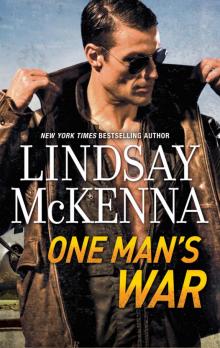 One Man's War
One Man's War Unbound Pursuit
Unbound Pursuit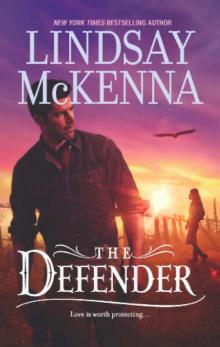 The Defender
The Defender Operation: Forbidden
Operation: Forbidden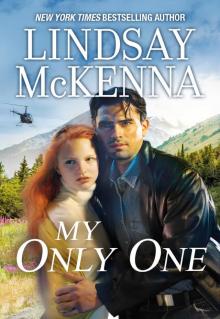 My Only One
My Only One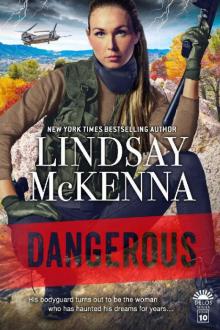 Dangerous: Delos Series, Book 10
Dangerous: Delos Series, Book 10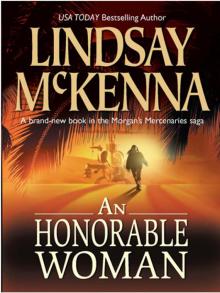 An Honorable Woman
An Honorable Woman Deadly Silence
Deadly Silence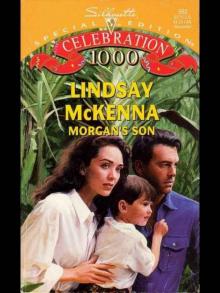 Morgan's Son
Morgan's Son Taking A Chance_Delos Series_Book 7B1
Taking A Chance_Delos Series_Book 7B1 Danger Close (Shadow Warriors)
Danger Close (Shadow Warriors) Solitaire
Solitaire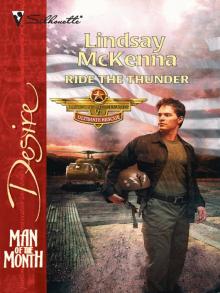 Ride the Thunder
Ride the Thunder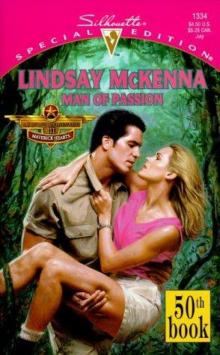 Man of Passion
Man of Passion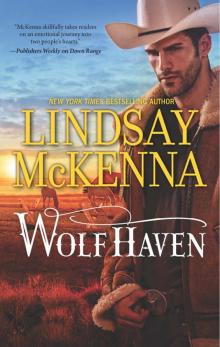 Wolf Haven (The Wyoming Series Book 9)
Wolf Haven (The Wyoming Series Book 9) Morgan’s Mercenaries: Heart of the Jaguar
Morgan’s Mercenaries: Heart of the Jaguar A Question of Honor
A Question of Honor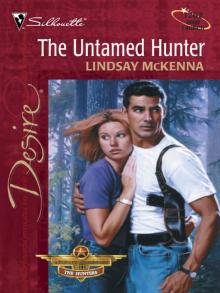 The Untamed Hunter
The Untamed Hunter Wind River Wrangler
Wind River Wrangler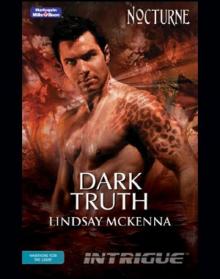 Dark Truth
Dark Truth Christmas Angel
Christmas Angel Broken Dreams (Delos Series Book 4)
Broken Dreams (Delos Series Book 4)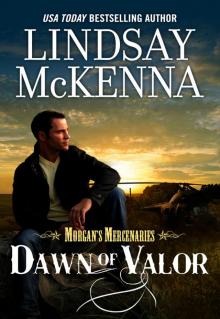 Dawn of Valor
Dawn of Valor Hold Me: Delos Series, 5B1
Hold Me: Delos Series, 5B1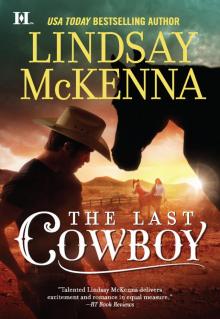 The Last Cowboy
The Last Cowboy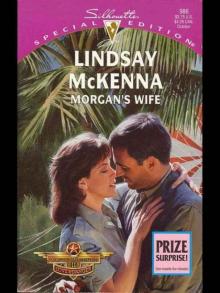 Morgan's Wife
Morgan's Wife Hostage Heart
Hostage Heart Heart of the Hunter
Heart of the Hunter Hold On (Delos Series Book 5)
Hold On (Delos Series Book 5) Snowflake's Gift (Delos Series Book 6)
Snowflake's Gift (Delos Series Book 6)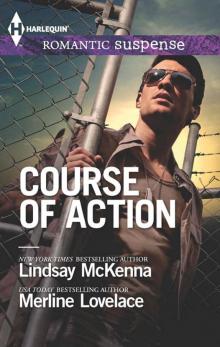 Course of Action: Out of Harm's WayAny Time, Any Place
Course of Action: Out of Harm's WayAny Time, Any Place Morgan's Mercenaries: Heart Of The Warrior
Morgan's Mercenaries: Heart Of The Warrior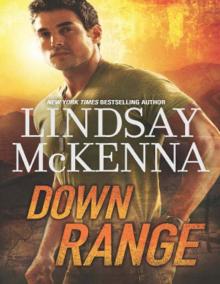 Down Range (Mills & Boon M&B) (Shadow Warriors - Book 2)
Down Range (Mills & Boon M&B) (Shadow Warriors - Book 2) A Chance Encounter
A Chance Encounter Out Rider
Out Rider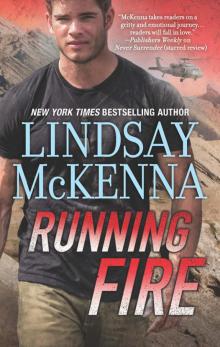 Running Fire
Running Fire No Surrender
No Surrender Morgan's Marriage
Morgan's Marriage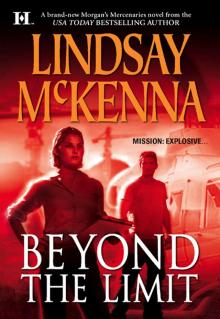 Beyond The Limit
Beyond The Limit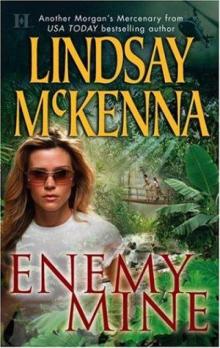 Enemy Mine
Enemy Mine The Gauntlet
The Gauntlet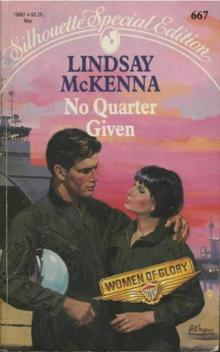 No Quarter Given (SSE 667)
No Quarter Given (SSE 667) Chase the Clouds
Chase the Clouds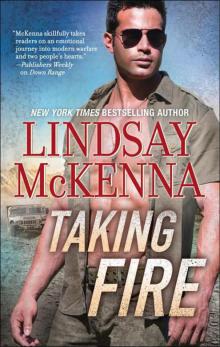 Taking Fire
Taking Fire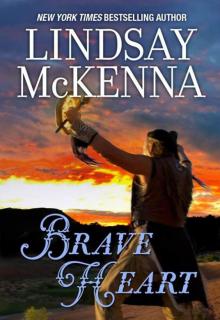 Brave Heart
Brave Heart Return of a Hero
Return of a Hero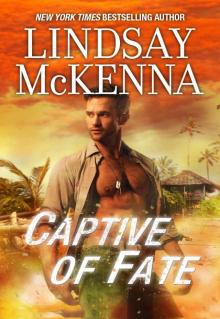 Captive of Fate
Captive of Fate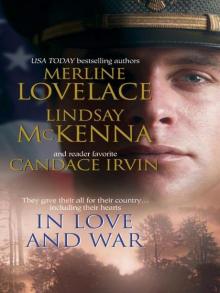 Comrades In Arms (In Love and War Anthology)
Comrades In Arms (In Love and War Anthology)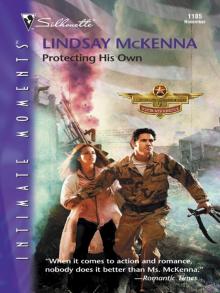 Protecting His Own
Protecting His Own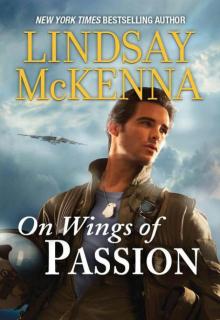 On Wings of Passion
On Wings of Passion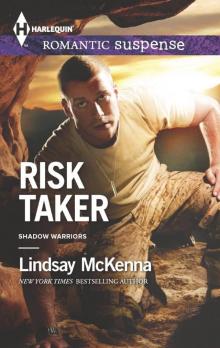 Risk Taker
Risk Taker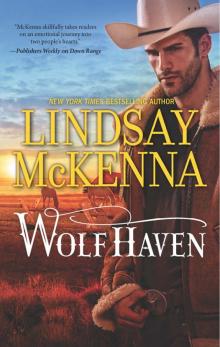 Wolf Haven
Wolf Haven Wilderness Passion
Wilderness Passion Come Gentle the Dawn
Come Gentle the Dawn Texas Wildcat
Texas Wildcat Touch the Heavens
Touch the Heavens The Loner
The Loner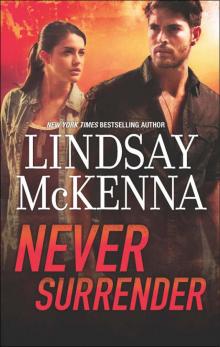 Never Surrender
Never Surrender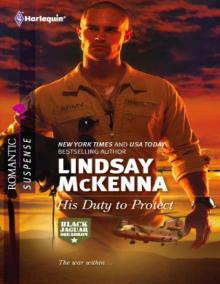 His Duty to Protect
His Duty to Protect Untamed Desire
Untamed Desire The Wrangler
The Wrangler When Tomorrow Comes
When Tomorrow Comes Heart of the Storm
Heart of the Storm Deadly Identity
Deadly Identity Dog Tags for Christmas
Dog Tags for Christmas Seeing Is Believing
Seeing Is Believing Nowhere to Hide (Delos Series Book 1)
Nowhere to Hide (Delos Series Book 1)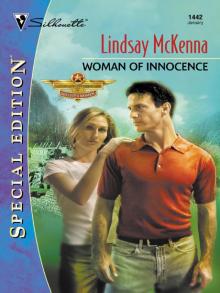 Woman of Innocence
Woman of Innocence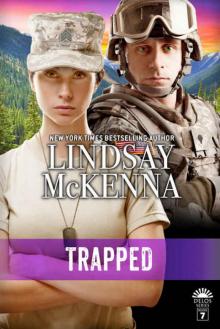 Trapped (Delos Series Book 7)
Trapped (Delos Series Book 7) Beginning with You
Beginning with You The Rogue
The Rogue Dream of Me: Delos Series 4B1
Dream of Me: Delos Series 4B1 Too Near the Fire
Too Near the Fire The Christmas Wild Bunch
The Christmas Wild Bunch Never Enough: Delos Series, 3B1
Never Enough: Delos Series, 3B1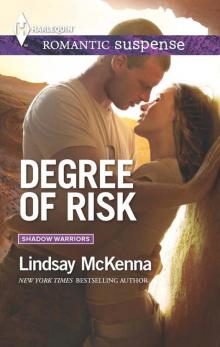 Degree of Risk
Degree of Risk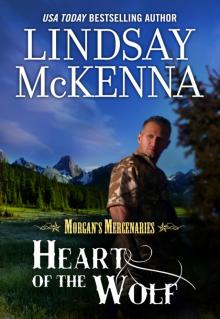 Heart of the Wolf
Heart of the Wolf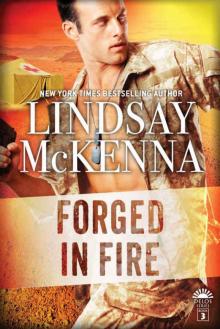 Forged in Fire (Delos Series Book 3)
Forged in Fire (Delos Series Book 3) Wind River Cowboy
Wind River Cowboy Wind River Lawman
Wind River Lawman Hangar 13
Hangar 13 The Adversary
The Adversary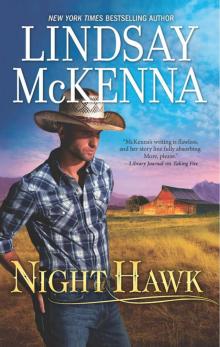 Night Hawk
Night Hawk Lone Rider
Lone Rider Silent Witness
Silent Witness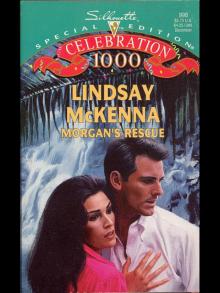 Morgan's Rescue
Morgan's Rescue Time Raiders: The Seeker
Time Raiders: The Seeker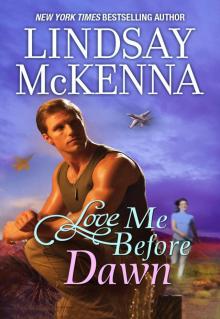 Love Me Before Dawn
Love Me Before Dawn Point of Departure
Point of Departure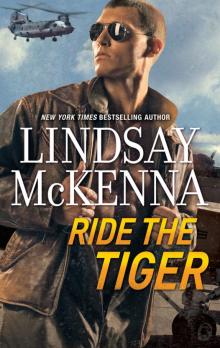 Ride the Tiger
Ride the Tiger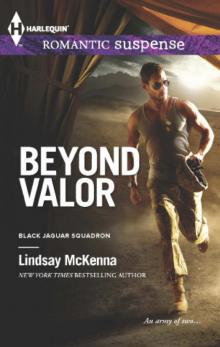 Beyond Valor
Beyond Valor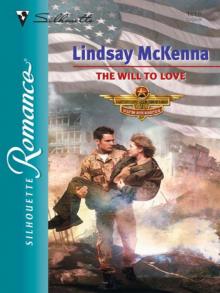 The Will to Love
The Will to Love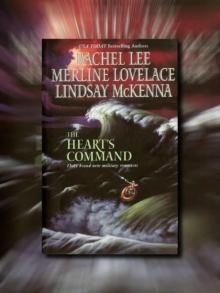 To Love and Protect
To Love and Protect